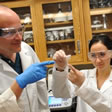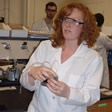 Felicia Nip, a third-year biochemistry and molecular biology major, is one of the 20 recipients to receive a Summer Undergraduate Research Fellowship (SURF) award. Nip has a genetics and toxicology project with mentor Thomas Werner, assistant professor of genetics and developmental biology… [read more]
Felicia Nip, a third-year biochemistry and molecular biology major, is one of the 20 recipients to receive a Summer Undergraduate Research Fellowship (SURF) award. Nip has a genetics and toxicology project with mentor Thomas Werner, assistant professor of genetics and developmental biology… [read more]
 Assistant Professor of Psychology Edward Cokely and colleagues have published on risk literacy as communicated through the use of graphs and other visual aids. The work has received the attention of several European and American newspapers and websites. One of the publications earned a Best Paper Award by the American Psychological Association… [read more]
Assistant Professor of Psychology Edward Cokely and colleagues have published on risk literacy as communicated through the use of graphs and other visual aids. The work has received the attention of several European and American newspapers and websites. One of the publications earned a Best Paper Award by the American Psychological Association… [read more]
 Dr. Jason Carter and graduate student Huam Yang of the Department of Kinesiology and Integrative Physiology are researching how our nervous system reflects the state of our bodies health, and how we can improve it with non-pharmaceutical methods… [watch the video]
Dr. Jason Carter and graduate student Huam Yang of the Department of Kinesiology and Integrative Physiology are researching how our nervous system reflects the state of our bodies health, and how we can improve it with non-pharmaceutical methods… [watch the video]
 Lanrong Bi and Nazmiye Yapici are shining new light on the hidden processes within cells. For their groundbreaking research, Bi, an assistant professor of chemistry, and PhD candidate Yapici have received the Bhakta Rath Research Award. Working together, Bi and Yapici have developed fluorescent dyes with powerful new properties… [read more]
Lanrong Bi and Nazmiye Yapici are shining new light on the hidden processes within cells. For their groundbreaking research, Bi, an assistant professor of chemistry, and PhD candidate Yapici have received the Bhakta Rath Research Award. Working together, Bi and Yapici have developed fluorescent dyes with powerful new properties… [read more]
 Industrial archaeology studies the past and seeks to enshrine it as heritage. In that undertaking, archaeologist Tim Scarlett, of the Department of Social Sciences, has his eyes focused far into the future: he wants an ironclad way to preserve artifacts in order “to curate into perpetuity.” Scarlett and chemical engineering professor Gerard Caneba have received $25,000 from the National Park Service to research methods to combat rust, which is iron’s ill fortune… [read more]
Industrial archaeology studies the past and seeks to enshrine it as heritage. In that undertaking, archaeologist Tim Scarlett, of the Department of Social Sciences, has his eyes focused far into the future: he wants an ironclad way to preserve artifacts in order “to curate into perpetuity.” Scarlett and chemical engineering professor Gerard Caneba have received $25,000 from the National Park Service to research methods to combat rust, which is iron’s ill fortune… [read more]
 Jason Carter, chair of the kinesiology and integrative physiology department, started us out with an overview of research at the SDC. Biology PhD student Huan Yang described her work on sleep deprivation. In Assistant Professor Karen Roemer’s biomechanics lab, biomed PhD student Stephanie Hamilton ran through routines to record movement… [read more]
Jason Carter, chair of the kinesiology and integrative physiology department, started us out with an overview of research at the SDC. Biology PhD student Huan Yang described her work on sleep deprivation. In Assistant Professor Karen Roemer’s biomechanics lab, biomed PhD student Stephanie Hamilton ran through routines to record movement… [read more]
 From leading-edge research to extraordinary showmanship, few scientists have made as big an impact on their field as astrophysicist Robert Nemiroff, the corecipient of the 2012 Research Award. In nominating Nemiroff, physics professor Don Beck and Ravindra Pandey, chair of the physics department, cited his research based on gravitational lensing, noting that his groundbreaking predictions regarding binary stars, quasars and microlensing events have been proved correct…. [read more]
From leading-edge research to extraordinary showmanship, few scientists have made as big an impact on their field as astrophysicist Robert Nemiroff, the corecipient of the 2012 Research Award. In nominating Nemiroff, physics professor Don Beck and Ravindra Pandey, chair of the physics department, cited his research based on gravitational lensing, noting that his groundbreaking predictions regarding binary stars, quasars and microlensing events have been proved correct…. [read more]


